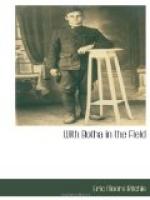On the 2nd of November we left Pretoria again. More trouble was brewing at Brits, close to Pretoria. We trekked straightway to Zoutpan’s Drift, the commandos again pursuing a body of rebels who, cutting through the railway line, had caused damage at De Wilts or Greyling’s Post, twenty miles or so outside the Union capital. Quite unwilling to make a stand, the insurgents were again put to flight, and General Botha returned to Pretoria the following day. In the meantime other loyalist columns in the Transvaal had taken to the field, and the rebellion seemed well in hand.
SECTION II
DE WET
Compared with the Free State insurrection, the Transvaal affair appeared in many ways to be a small business from our point of view. In actuality it was nothing of the kind. It was, if anything, much more ugly in spirit. The genius of the Free State section of insurgents displayed itself chiefly in a highly finished exposition of lying, looting and “legging it.”
De Wet’s delirious harangue had not exhausted its nine-days’ life as a masterpiece of unconscious humour when General Botha left Pretoria for the Free State on November 9. Again, I am not concerned with the highly complex motives which prompted the veteran Dutch General to make his delightful “Five Bob Outrage” speech and other things at Vrede. Flogging dead horses is a useless job, anyway.
During the journey to the Free State, our guard en the train was extremely strict. Though every possible precaution of secrecy had been taken, we were positively told to be prepared to find the train fired upon. But, if during such journeys preparedness was doubtless essential in the circumstances, it always seemed to me that we, or any one so placed, were pretty powerless to avert disaster should a properly directed shot from the darkness find its mark.
On November 11 we detrained at Theunissen, in the Free State. It was speedily clear that this part of the world was in the grip of disturbance. Telegraph poles all along the line had been wrecked; an amount of mild pillaging had been going on. The people of Theunissen were almost in panic. The two fights—one against Conroy, at Allaman’s Kraal, the other and larger, against De Wet, at Doornberg—had been enormously magnified. General Botha was welcomed in genuine relief. We remained at arms in the train during the first part of the night. At 2 a.m. we were roused, and in less than half an hour were on the way across country to Winburg.
The arrival at the little railhead dorp of Winburg was remarkable. Scarcely were we halted and hand put to loosen girth before the loyalist leaders came running out in the morning sunshine to meet us. De Wet had left the place two hours before, disappearing with his following over the first kopje. He had caused absolute panic. His forces had cut the inhabitants off from all touch with the outer world. De Wet had commandeered all food supplies worth having. Houses had been looted and speeches were made in the marketplace. His followers had assured the people that the Empire was tottering, Germany had defeated Britain on land and sea, a hundred thousand were marching on Pretoria, and that Botha and his Government were defeated and disgraced. And these statements were to a large extent believed.




